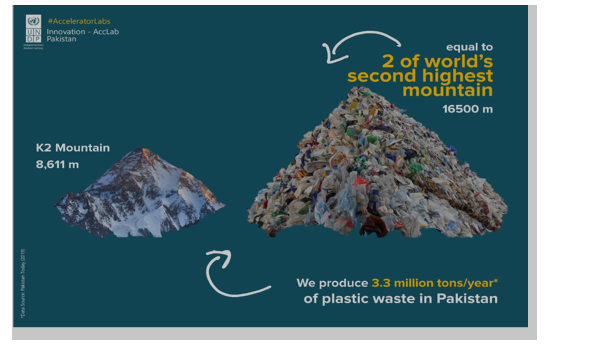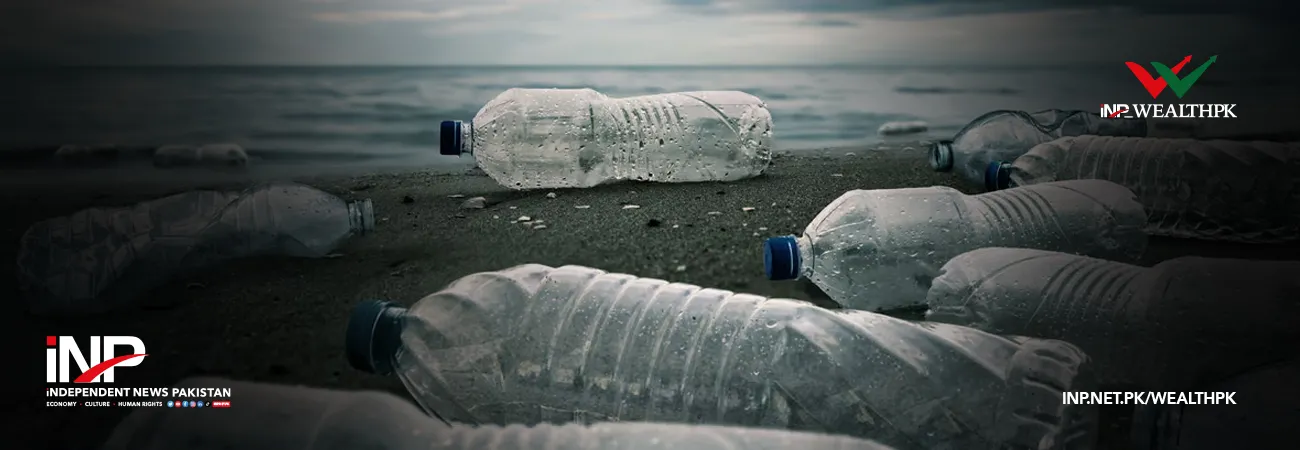INP-WealthPk
Azeem Ahmed Khan
Pakistan, grappling with one of South Asia's highest mismanagement rates, needs to recycle over 3.3 million tonnes of plastic material every year. The United Nations Development Programme (UNDP) highlights that Pakistan's plastic trash is not properly recycled, resulting in the accumulation of plastic debris in landfills, unregulated dumping sites, and water bodies. The magnitude of this issue is staggering; if all the plastic waste in landfills were piled together, it could reach a height of over 16,500 meters, surpassing the elevation of K2, the second-highest peak on the planet.

The World Wildlife Fund for Nature (WWF-Pakistan) underscores that plastic bags, PET (polyethylene terephthalate) bottles, and food scraps constitute a significant portion of Pakistan's 250 million tonnes of garbage. Additionally, water bottles, caps, plastic bags, and packaging contribute to 65% of the litter found along the country’s coastlines. Alarmingly, an estimated 8 million tonnes of plastic waste enters the oceans annually, raising concerns that by 2050, the ocean could contain more plastic than fish. Plastics, due to their toxicity and non-biodegradability, pose a severe threat to environment.
Simple plastic bags can take up to 500 years to degrade, while plastic bottles might endure for as long as 300 years. In Pakistan alone, a staggering 55 billion plastic bags are used each year, with an anticipated yearly increase of 15%. The WWF-Pakistan advocates for immediate, and effective measures to curtail plastic consumption in order to safeguard both the nation and the planet. Recognising the gravity of the situation, Pakistan has enacted stringent measures to ban single-use plastics in the federal capital city of Islamabad, accompanied by substantial fines for violations. These actions aim to discourage future usage, mitigating adverse impacts on human health and environment.
The Single-use Plastics (Prohibition) Regulations 2023, according to the Ministry of Climate Change and Environmental Coordination, comprehensively bans the usage, production, import, distribution, sale, stocking, purchase, and exchange of numerous plastic products. Penalties for manufacturers and importers can reach up to Rs1 million, while retailers, hawkers, stallholders, and suppliers may face fines of up to Rs10,000. Individual users of single-use plastics could be fined up to Rs1,000 under the new laws. Prohibited items include polythene bags, bowls, cups, cutlery, containers, boxes, plates, and stirrers.
The Environment Protection Department is mandated to enforce these regulations, empowered to seize non-compliant stock, raw materials, and products. Furthermore, commencing July 1, 2028, all plastic bottles must incorporate at least 50% recycled plastic content. The federal government spearheads efforts to reduce plastic consumption in Pakistan, urging the provincial governments and the general populace to join this mission. In a bid to combat pollution stemming from plastic water bottles, all the federal government agencies, including the Prime Minister's Office, are committed to using exclusively refillable water bottles and containers. Since the mid-20th century, plastic production has surged, leading to a proliferation of single-use items.
Unfortunately, almost half of all plastic is utilised just once and then discarded. A mere 9% of the global plastic waste is recycled, imperilling the sustainability of our ecosystems. Plastic contamination has infiltrated our oceans, rivers, and sewage systems, resulting in the Indus River being ranked as the second-most polluted river globally. Disturbingly, nano-plastics are being ingested by people through food, beverages, and the air, warns the International Union for Conservation of Nature (IUCN)-Pakistan. Roughly 400 million tonnes of plastics are manufactured annually, with a substantial portion ending up in oceans, soil, and eventually our food chain, exacting a detrimental toll on the environment, economy, and human well-being.
Most plastic items break down into smaller particles rather than completely disappear, leading to the accumulation of microplastics in organs through inhalation and absorption. Even the Arabian Sea receives plastic debris from rivers, with fish now consuming microplastics that ultimately find their way onto dinner plates. With alarming statistics revealing the scale of the crisis, the UNDP emphasises that corrective actions are imperative. Globally, one million plastic bottles are purchased every minute, while up to five trillion plastic bags are used annually. Half of all plastic production is dedicated to single-use items that are rapidly discarded.
Alarmingly, less than 10% of the cumulative 7 billion tonnes of plastic waste generated worldwide to date has been recycled. Pakistan faces an urgent task to address its mounting plastic waste crisis. Through comprehensive regulation, proactive measures, and individual responsibility, the nation can aspire to mitigate the detrimental impacts of plastic pollution on its environment, health, and future well-being.
Credit: INP-WealthPk













